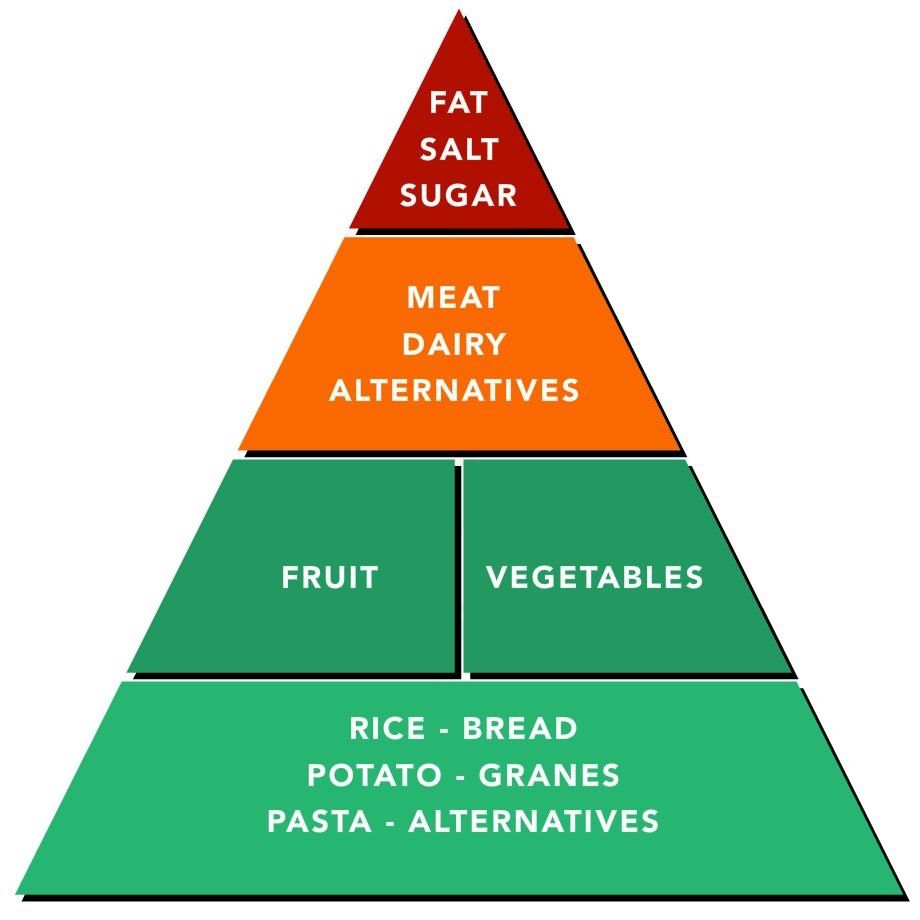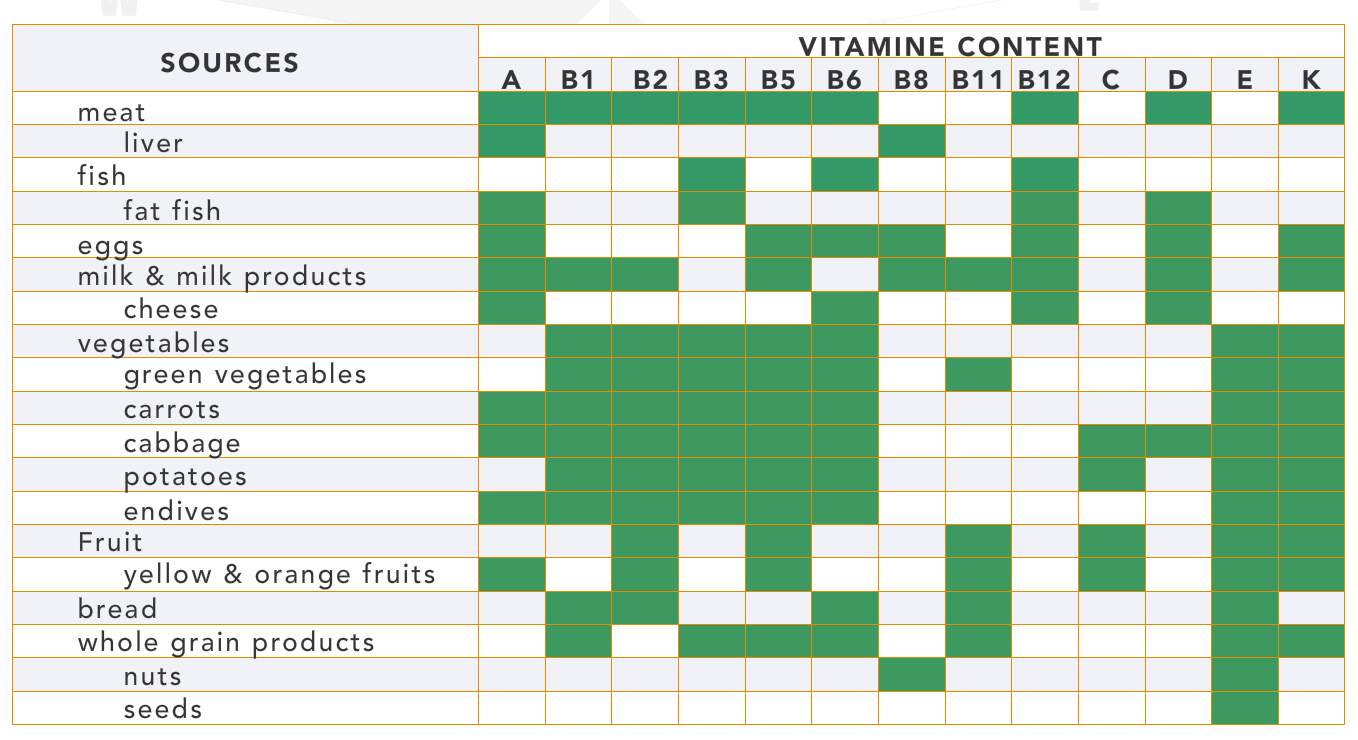Healthy food
Basics of healthy food
Meals have to supply enough proteins for formation and repair of body tissues, adequate supply of minerals to reinforce body tissues and sufficient carbohydrates and the right amount of fats for energy. There must also be vitamins and anti-oxidants to keep the body’s functions in good order. Crucially good quality drinking water needs to be drunk in large quantities, at least 1,5 liters per day.
A good tool in ensuring a balanced diet is a food pyramid. As food habits vary a lot throughout the world, it is difficult to give a universal practical guide to healthy eating and the preservation of good health but the essential elements are explained below.
There should be sufficient protein for the formation and repair of body tissues, adequate supply of minerals to reinforce body tissues, sufficient carbohydrates and the right amount of fats for energy and vitamins to keep the brain, nerves and other vital organs functioning.
o Eat a variety of foods or a varied diet, balance is the key message
o Eat plenty of fruit (3 servings / day), vegetables (300 g / day) and potatoes (3-5 / day)
o Choose more dark green and bright coloured vegetables and orange fruits
o Reduce the amount of meat (+/-100 g / day), fat (< 35%), oil, sugar and salt you eat
o Drink plenty of safe drinking water (> 1.5 liters / day or 6 to 8 glasses / day)
Breakfast is the most important meal of the day, delivering 20-25% of the total energy for that day.
o Breakfast prevents loss of concentration and dexterity during the morning
o Carbohydrates found a lot in bread, grain products, rice and pasta are excellent sources of energy: choose higher fiber, whole grain options
o Skimmed and half-fat milk and milk products are good sources of proteins at breakfast
o
Fruit should be eaten several times per day, it is a good idea to start the day, with fruit or 100% fruit juice
Rice, whole grain products and potatoes
At the base of the pyramid are rice, noodles, bread, pasta, cereals, potatoes, porridge, lontong, chapati, naan, idli, thosai and biscuits. These foods are excellent sources of complex carbohydrates, vitamins, minerals and dietary fibre.
It is recommended that 5 servings a day be consumed, preferably including 1 serving of wholegrain products.
An average person eats 175-420 g of bread (5-12 slices), 210-350 g potatoes (3-5 pieces) or 180-300 g of rice per day. When working in shifts this group is better taken towards the end of the shift, instead of at the beginning.
Fruit
This group consists preferably of fresh fruit but also of dried, frozen, canned fruit and fruit juices. They are rich sources of vitamins A, C, potassium, fiber (excluding fruit juices) and flavonoids.
Eat 2 to 3 servings a day, especially the deeply or brightly (yellow, orange) coloured ones.
Vegetables
This group consists of leafy, non-leafy, cruciferous and root vegetables. They are rich sources of vitamins A, C, folic acid, minerals such as calcium, iron, potassium, fibre and phyto-chemicals.
Eat 2 servings a day and include 1 serving daily of dark green or yellow-orange vegetables.
Fibre
Fibre is the indigestible carbohydrate found in plant cell walls and is either soluble or insoluble. Soluble fibre acts like a gel and insoluble fibre adds bulk to or softens stools. A healthy fibre content of the diet can be achieved by eating fruits, vegetables, beans and whole grains.
Also, when eating whole grains, increase your fluid intake as insoluble fibre absorbs fluid from your intestines.
The benefits of fibre:
To get the full health benefits of dietary fibre, adults should eat 25 to 35 grams of fibre each day. Consume more whole grains, whole fruits and vegetables. Much of the fibre is in the peel. Nearly all varieties of beans are a rich source of fibre. Spinach and romaine lettuce are healthy choices. White bread and white rice have had the fibre processed out of them.
Meat, fish, and alternatives
This group includes meat, poultry, fish and seafood. Alternatives are soya, pulses, nuts and seeds. These foods are excellent sources of protein, iron and zinc. 100 g per day can be sufficient depending upon burned calories.
Milk, dairy-products and alternatives
These foods are excellent sources of protein, calcium and B vitamins. Drink 2 to 3 glasses of skimmed or half fat milk or yoghurt per day and try to eat 2 servings of cheese. Remember to bear in mind the fat quantity in these foods and to try and use low fat products where possible.
Fats, oil, salt & sugar
Although fat gives energy and contains essential vitamins A, D, E and K, too much of it can lead to increased weight and increased cholesterol levels. Therefore it is important to keep an eye on the amount of fat you eat, so that you don’t eat too much. This group contains chips, mayonnaise, fat sauces, cream, etc. and should be taken in limited quantities.
High salt consumption can raise blood pressure which creates a greater risk of developing heart disease.
Sugary food and drinks are loaded with calories and provide little to no nutrition. Such foods are also a major source of tooth decay.
Some fats are essential for your health.
Fats in foods are made up of 4 different types of fatty acids:
o Polyunsaturated fats
o Monounsaturated fats
o Saturated fats
o Trans fats
Trans fats are found naturally in some animal-based foods, but are also formed when liquid oils are made into semi-solid fats like soft and hard margarine. Scientific evidence has shown that dietary trans fats can increase your risk of developing heart disease.
Polyunsaturated fats are healthier than monounsaturated but today a distinction is made: omega 3-omega 6-and omega 9 fatty acids, which are types of polyunsaturated fats.
Omega 3 is an essential fat and plays a crucial part in the development of the brain and nervous system; it prevents cardiovascular disease, and supports the immune system.
In general, the types of food eaten in the West do not contain enough omega 3 fatty acids. The balance between omega 6 and omega 3 is particularly important as both use the same enzymes in metabolism. Omega 3 is found in algae, plankton, rapeseed, line seed, walnut or soya oil. Fat fish and fish oil contain a lot of omega 3 fatty acids.
Water
Although water does not give us energy and is not part of this food pyramid, it is indispensable for our body. In normal circumstances 1.5 litres should be consumed per day. In warm climates, when undertaking strong physical activity and playing sport it is necessary to drink more fluids. It is best to drink water from unopened bottles if the quality of drinking water is uncertain. Not everybody can drink all types of mineral water as some contain a high level of minerals. Variation is the key!
Products containing caffeine, such as tea, coffee and soft drinks should not be drunk more than 3 times per shift and should be avoided five hours before sleeping.
Vitamins
Food loses a lot of vitamins during the time left between storage and preparation. The time between harvest and consumption is a determining factor, but the temperature at which food is stored is also important. Vegetables that are frozen shortly after harvesting do not loose more vitamins than so called fresh vegetables. Furthermore, vegetables will retain more vitamins if they are only cooked for a short period. The shorter the cooking time, the more vitamins they will retain!
Anti-oxidants
When the body is metabolising normally, free radicals are formed which have a negative impact on the body’s functions. Smoking stimulates the production of free radicals. High levels of free radicals can damage the body’s cells, cause heart and vascular diseases and cancer. There is evidence to suggest that they also speed up the ageing process and can lead to cataracts and other eye diseases. Anti-oxidants neutralise the harmful actions of free radicals, and as such, have a positive effect on health. In addition to vitamins, there are other bio-active products such as flavonoids and minerals for example, selenium, which act as anti-oxidants.
The amount of anti-oxidants we need on a daily basis to prevent disease is not yet clear to medical professionals. Research is still underway on the use and safety of antioxidant preparations. Therefore healthy food habits are considered sufficient.
Food, Shift work and Watch keeping!
Bad eating habits during periods of shift work or watchkeeping, can lead to sleeping problems, nausea, digestive problems, problems in staying awake, greater chances of becoming overweight and cardiovascular problems.
o Light meals are the best idea: soups, salads and lean meat
o At the beginning of the shift, eat protein rich food such as skimmed milk, yoghurt and lean meat.
These give a slower and steady release of energy.
o Later on in the shift eat carbohydrate such as bread, potatoes, salad, pasta salad, fruit and whole grains. These help you to sleep better.





